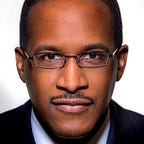The Transformative Power of the Lecture Series (and why every HBCU needs one)
I recently took ten of my first year students on a field trip to Xavier University to hear Dr. Marc Lamont Hill. These 10 are part of my 30 student group called PODUS, my presidential ambassadors (I’m PODUS- President Of Dillard University number Seven). One of their key duties is to work our lecture series, Brain Food. The idea is that this group gets immersed in a high profile role on campus, and then they move on to other leadership roles on campus.
I would say that goal has been met. Our current SGA president, vice president and secretary came through the program, as well as the senior, junior and freshman class presidents.
But I wanted them to go and just experience an event somewhere else. Our sister UNCF institution, Xavier, started a Black History Month lecture series this year with Dr. Marc Lamont Hill kicking it off. While listening I heard part of his back story I did not know.
I knew he began his collegiate career at Morehouse. He said during his freshman year while attending the Crown Forum, a lecture/event series, that he was exposed to one Dr. Michael Eric Dyson. Marc shared that he stopped goofing around to listen to Dr. Dyson, and mentioned to his friend that he didn’t know what that was that Dyson did, but he wanted to do that.
Hill was inspired to become a professor by Dyson because of attending the Crown Forum at Morehouse. Hill also was a grad assistant for Dyson later on, and revealed that Dyson helped pay for his grad studies. He shared that while he finished most of his college career at PWIs, Morehouse was always home because of this transformative event.
The Crown Forum may be the longest running HBCU lecture series. I started a series at Philander Smith College called “Bless the Mic” in 2005, and it is now in its 12th year.
Fort Valley State has had its John W. Davidson lecture series since the early 2000s- I remember going to see Dr. Henry Louis Gates there around 2004. Prairie View has it “SPIT Knowledge” series; North Carolina Central has “Rock the Mic.” Many campuses have departmental series as well.
But the lecture series provides what columnist Bill Maxwell calls “texture.” This is a way that students can be exposed to new ideas from engaging personalities, and as Maxwell argues, Black students might even benefit from this more than others. I know I personally benefit from hearing a range of ideas as I look to continue to grow.
Hill’s testimony touched me not just because he validated the transformative power of lectures. in 1996 when I was finishing my doctorate at Georgia State, I read an article in The Chronicle about Michael Eric Dyson. That article inspired me to believe that I could be a “cool” college president. I mean, he was called the “hip hop intellectual.”
And 8 years after reading that article I became the hip hop president.
So when I started my lecture series at Philander, I started it with Dyson. He continues to inspire me and I’m glad to call him my friend (just don’t believe his story about me not going with him to the Super Bowl here in New Orleans).
Our students want to be inspired, and a lecture series offers that possibility.
The Prez
